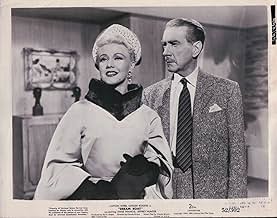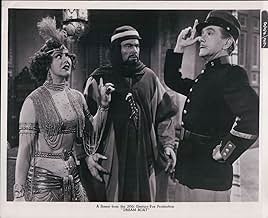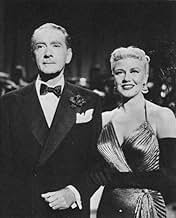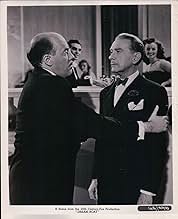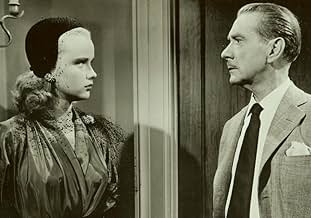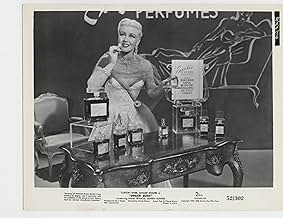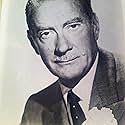Aggiungi una trama nella tua linguaRespected college professor Thornton Sayre is plagued when his old movies are shown on TV, and sets out with his daughter to stop it. However, his former co-star is the hostess of the TV sho... Leggi tuttoRespected college professor Thornton Sayre is plagued when his old movies are shown on TV, and sets out with his daughter to stop it. However, his former co-star is the hostess of the TV show playing his films, and she has other plans.Respected college professor Thornton Sayre is plagued when his old movies are shown on TV, and sets out with his daughter to stop it. However, his former co-star is the hostess of the TV show playing his films, and she has other plans.
- Tavern Patron
- (non citato nei titoli originali)
- Desk Clerk
- (non citato nei titoli originali)
- Student
- (non citato nei titoli originali)
- Hotel Clerk
- (non citato nei titoli originali)
- Commandant in Silent Movie
- (non citato nei titoli originali)
- Restaurant Patron
- (non citato nei titoli originali)
- Man in Lobby
- (non citato nei titoli originali)
- Gloria's Backup Singer
- (non citato nei titoli originali)
Recensioni in evidenza
I suppose it's hard to imagine for today's audience a television in its infancy. But in 1952 it still was and a good way to fill up a lot of programming time was to broadcast old films. Even the silent ones. In my youth WOR TV in New York City was an RKO station and had the entire RKO library available to it. In the infant days of that station their programming was mostly old films as I remember.
Anyway Clifton Webb is quite content to be out of the Hollywood scene and he's quite annoyed that his past has been resurrected. He and daughter Anne Francis have law suit on their minds.
It's a dated story, but the script is quite good with some nice witty lines for Webb and Rogers to toss back and forth at each other. Among the supporting cast, the biggest kudos should go to Elsa Lanchester the prim and proper college president who discovers she's got a genuine sex object on her faculty and wants to do something about it.
What's great is that this comedy doesn't pretend to be anything more than what it is: an amusing trifle with nifty observations about the film, television and radio industries.
One of our favorites, it's also to date (2004) not available on vhs, dvd, or shown on tv. Production Studio Twentieth Century Fox must know something we don't.
It is not until Templeton that the studio revises it's views on the talented Mr. Webb. Up till that time, Webb was seen as a sophisticated (perhaps effeminate) villain - and had played the part well twice. Templeton is villainous only in one area - he sees no future for his niece Isabel (Gene Tierney) with Larry Darrell (Tyrone Power), so when Isabel breaks with the latter Elliott encourages her to do so (using her future large inheritance from him as a lure). He also suggests she marry Gray (John Payne), a safer, more reliable husband (and a stockbroker). This may seem villainous (if you like Power's character), but he accepts it readily enough. Isabel actually is more villainous as the story progresses, getting rid of a weakened rival with truly fatal results. But Elliott just becomes a selfish, self-indulgent joke as the film progresses. In the end we welcome him for being funny (in an unintentional way). After Elliott Templeton it occurred to 20th Century Fox (and later other studios) that Webb could be a comedian - and a sharp one.
They should have realized this to begin with. Webb, in his youthful heyday of first Broadway stardom (1920 - 1940) was a leading musical comedy star. Most people seeing him today as Mr. Belvedere or as John Philip Sousa (ironically, his only musical film part), or as the doomed Richard Sturgis in TITANIC can't think of him as one of the best singer comedians in Broadway history - at one point the leading rival to Fred Astaire! His decision to make STARS AND STRIPES FOREVER in 1953 destroyed the one opportunity he would have had to strut his musical comedy talents on celluloid. Vincent Minelli hoped he'd play Geoffrey Cordova, the "Renaissance Man of the Theatre" in THE BAND WAGON. He would have played with Astaire. Instead the film has British musical comedy star Jack Buchanan in the role.
What he might have been like as a silent film comic actor (or even dramatic actor) is hard to say. He only has one surviving modern film which tackles this issue. In 1952 he played Bruce Blair, once the partner with Gloria Marlowe (Ginger Rogers) in a series of silent romantic dramas. Their partnership is like that of Ronald Colman and Vilma Banky, who made about five films together in the late 1920s. Blair left movies at the end of the silent period - tired of the grind, and wanting to teach literature at college (where the superior Webb would gravitate too naturally). He is using his real name, Thornton Sayre, as his professorial name. He is there with his daughter, and a seemingly quiet academic life. Then all hell breaks lose - Gloria has been hired to be the hostess of a television series showing their old popular movies. And they are a hit. But they have made his students, fellow academe, and the head of the college (a hopelessly adoring Elsa Lanchester) recognize Sayre for whom he actually was.
The plot has Webb trying to bring legal action to prevent the showing of the films (particularly as ridiculous sound effects and rewritten message cards advertising products are making him look idiotic). Gloria backed by her agent/producer (Fred Clark) fight this, and Gloria - in trying to vamp Bruce - remembers how she did like him years ago but lost him to another woman. All of which leads to a final courtroom showdown.
The whole film is funny, but the best bits were Webb overacting (in the silent film method) in the silent films he made, such as a World War I aviation epic, which ends with a crash (but he's still able to kiss his beloved Rogers in his trademark triple arm kiss - they are in a clinch at the fade out of the silent film). There is also a priceless scene where an angry drunk in a bar starts a fight with Webb for accidentally turning on his wife. Webb, no physical pushover here, watches the physical wrestling throws of twenty five years earlier on the television screen, and repeats them on the drunk!
The problems with misused silent films bugged many retired film figures in the early days of television. Stan Laurel was angry at the butchering of his comedies for commercials (it ruined well planned timing for gags). So the film actually does show a situation that existed in early television. It also partly answers the question of what Webb would have been like in an earlier age of movies.
This is a deftly amusing film in which Hollywood is poking fun at the silliness of its arch-rival of the 1950s, TV. It also pokes fun at its own early days of silent melodrama.
The film is an enjoyable experience overall, but especially delicious is Webb as the prim professor who is also the soap-opera film star of old Hollywood.
Lo sapevi?
- QuizThe scenes at the end which are supposedly from Bruce Blair's "new" movie are actually scenes from Governante rubacuori (1948), the first of Clifton Webb's Mr. Belvedere trilogy. The theater marquee correctly identifies the film as "Sitting Pretty", blurring the line between real-life actor Clifton Webb and his actor character Bruce Blair in this film.
- BlooperWhen Miss Marlowe's cab arrives at her "real" hotel after she leaves the flophouse, the headlights are off (probably to reduce glare), but when the angle changes the lights are back on.
- Citazioni
Gloria Marlowe: You ungrateful, untalented hypocrite.
- ConnessioniFeatures Governante rubacuori (1948)
- Colonne sonoreYou'll Never Know
(uncredited)
Music by Harry Warren
Lyrics by Mack Gordon
Performed by Ginger Rogers and others at the nightclub
I più visti
- How long is Dreamboat?Powered by Alexa
Dettagli
- Tempo di esecuzione
- 1h 23min(83 min)
- Colore
- Proporzioni
- 1.37 : 1


